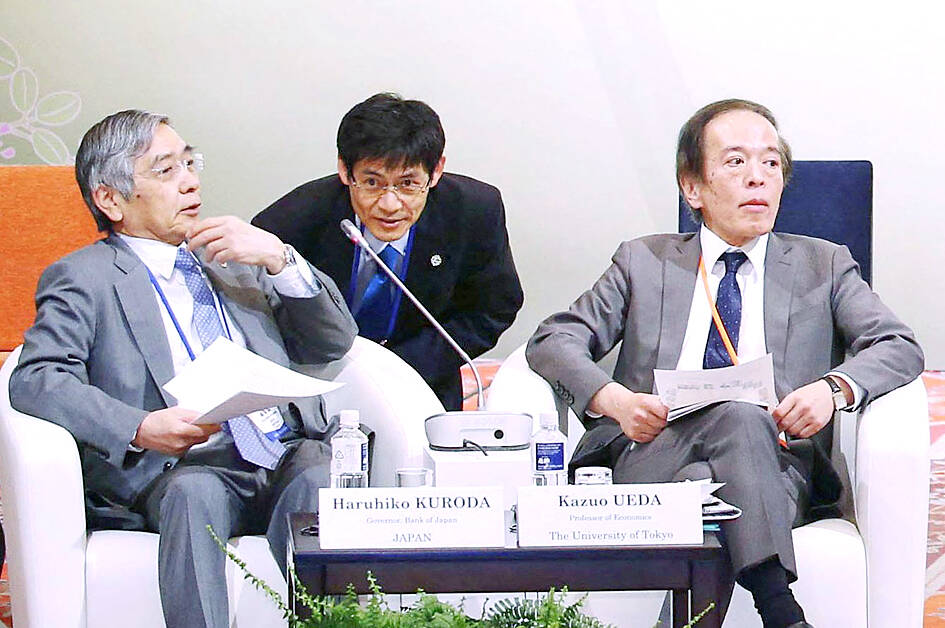The Japanese government is likely to appoint Kazuo Ueda, an academic and a former member of the Bank of Japan’s (BOJ) policy board, as the central bank’s next governor, the Nikkei newspaper reported yesterday.
Here are reactions to the report:
“The key thing for me is that [BOJ Deputy Governor Masayoshi] Amamiya appears to have turned down the offer to have been made governor of the Bank of Japan. He has been at the BOJ a long time and was considered a key supporter of [BOJ Governor Haruhiko] Kuroda and his policies, that is very loose monetary policy and a weak JPY [yen]. So with him gone, the reaction we are seeing is probably one of relief that the current weak-JPY policy may be coming to an end,” said Stuart Cole, head macro economist at Equiti Capital in the UK.

Photo: REUTERS
“However, the apparent choice for governor now — Ueda — is somewhat of a wild card for the markets. He has been a policymaker at the BOJ in past, from 1998 to 2005, but what his views are on the current monetary policy stance are mostly unknown. So we could yet be in for a volatile ride in the JPY if he turns out to be singing from the same hymn sheet as Kuroda,” he said.
Jane Foley, head of foreign exchange strategy at Rabobank in London, said there are “various papers published by him” on the BOJ Web site since 2005, “but they’re quite few and far between, and I think he was not top of the list.”
“What I would imagine, is that because he has been on board of the Bank of Japan, that he is relatively dovish, because just about everyone that’s been on the board of the Bank of Japan has been dovish for a long time. Right now, to be honest, we can only assume that. We need some commentary from him,” she said. “I have been of the view for a while that probably — whoever takes over as the governor — there may not be any huge initial change in so far as everyone is trying to nurture inflation into place, everyone is waiting for the spring wage talks and the initial indications are a little bit positive, but perhaps not enough for a huge turnaround.”
“Even if Kuroda remained in control, we could get an adjustment in yield-curve control this year anyway,” Foley added.
Hiroaki Muto, an economist at Sumitomo Life Insurance Co in Tokyo, said that “Ueda seems a very different type from Kuroda, in terms of being an academic who would plainly conduct policy based on actual economic fundamentals and value conversations with the market.”
“He may not be super hawkish type either, so the upcoming [normalization] would take place very slowly, no matter how the new leadership revises the joint statement” with the government, Muto said.

SETBACK: Apple’s India iPhone push has been disrupted after Foxconn recalled hundreds of Chinese engineers, amid Beijing’s attempts to curb tech transfers Apple Inc assembly partner Hon Hai Precision Industry Co (鴻海精密), also known internationally as Foxconn Technology Group (富士康科技集團), has recalled about 300 Chinese engineers from a factory in India, the latest setback for the iPhone maker’s push to rapidly expand in the country. The extraction of Chinese workers from the factory of Yuzhan Technology (India) Private Ltd, a Hon Hai component unit, in southern Tamil Nadu state, is the second such move in a few months. The company has started flying in Taiwanese engineers to replace staff leaving, people familiar with the matter said, asking not to be named, as the

The prices of gasoline and diesel at domestic fuel stations are to rise NT$0.1 and NT$0.4 per liter this week respectively, after international crude oil prices rose last week, CPC Corp, Taiwan (台灣中油) and Formosa Petrochemical Corp (台塑石化) announced yesterday. Effective today, gasoline prices at CPC and Formosa stations are to rise to NT$27.3, NT$28.8 and NT$30.8 per liter for 92, 95 and 98-octane unleaded gasoline respectively, the companies said in separate statements. The price of premium diesel is to rise to NT$26.2 per liter at CPC stations and NT$26 at Formosa pumps, they said. The announcements came after international crude oil prices

A German company is putting used electric vehicle batteries to new use by stacking them into fridge-size units that homes and businesses can use to store their excess solar and wind energy. This week, the company Voltfang — which means “catching volts” — opened its first industrial site in Aachen, Germany, near the Belgian and Dutch borders. With about 100 staff, Voltfang says it is the biggest facility of its kind in Europe in the budding sector of refurbishing lithium-ion batteries. Its CEO David Oudsandji hopes it would help Europe’s biggest economy ween itself off fossil fuels and increasingly rely on climate-friendly renewables. While

SinoPac Financial Holdings Co (永豐金控) is weighing whether to add a life insurance business to its portfolio, but would tread cautiously after completing three acquisitions in quick succession, president Stanley Chu (朱士廷) said yesterday. “We are carefully considering whether life insurance should play a role in SinoPac’s business map,” Chu told reporters ahead of an earnings conference. “Our priority is to ensure the success of the deals we have already made, even though we are tracking some possible targets.” Local media have reported that Mercuries Life Insurance Co (三商美邦人壽), which is seeking buyers amid financial strains, has invited three financial